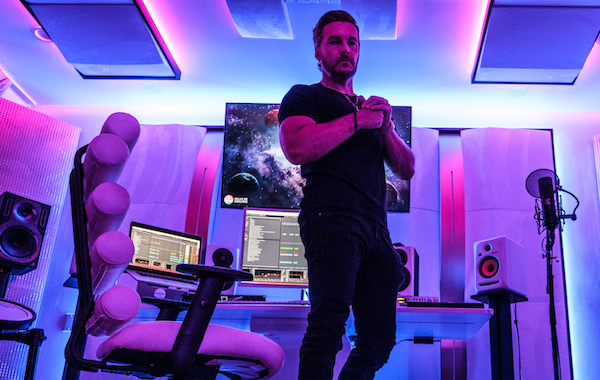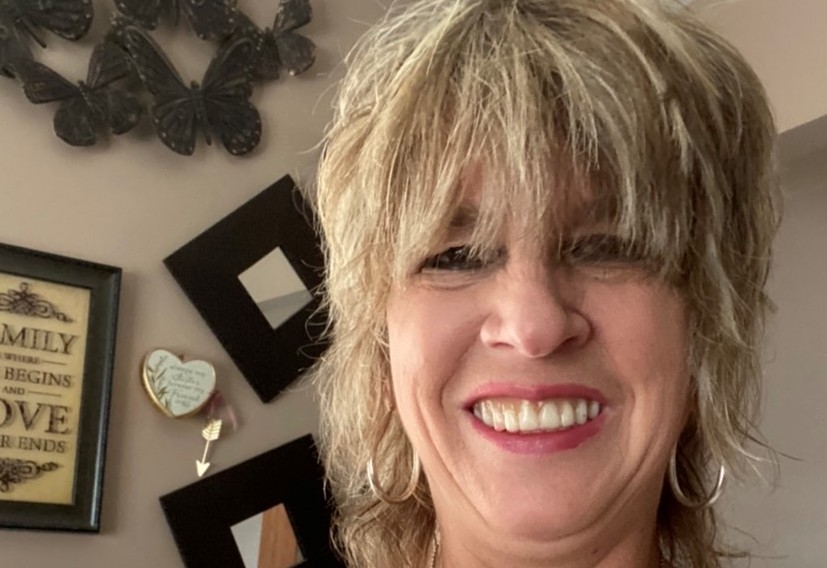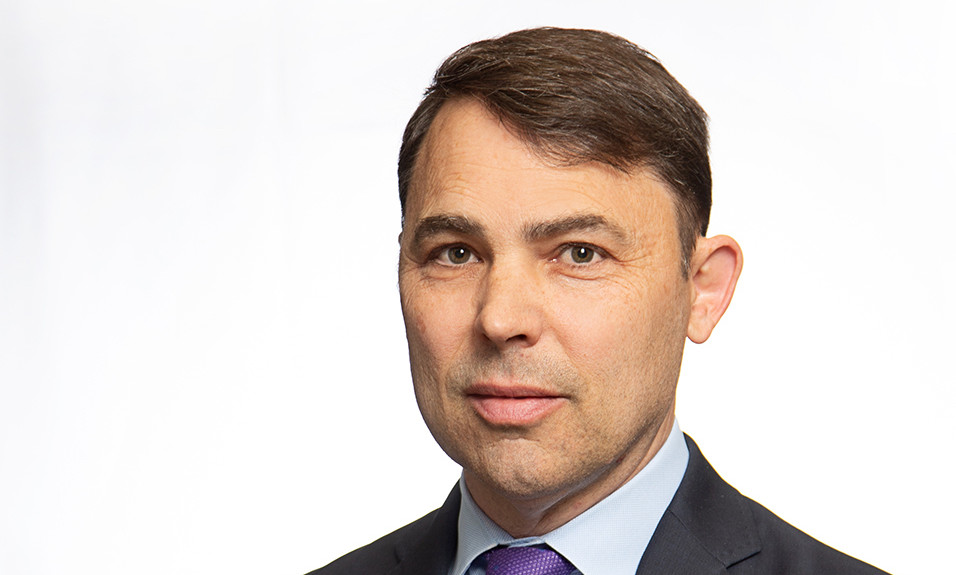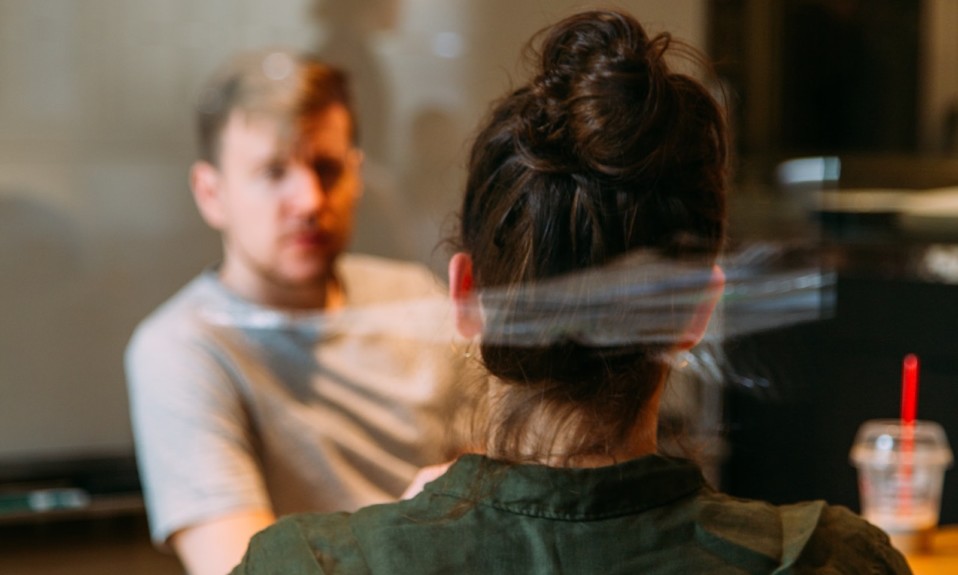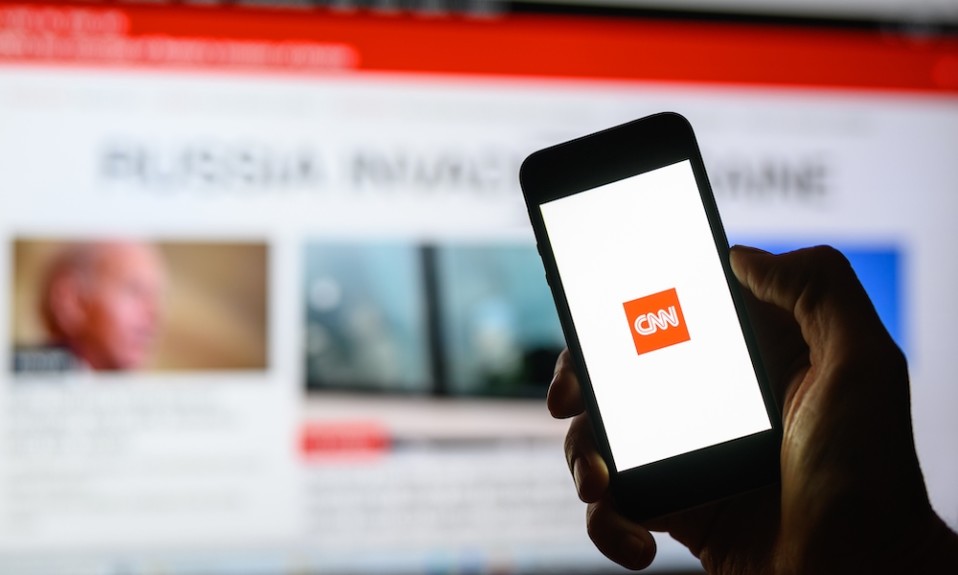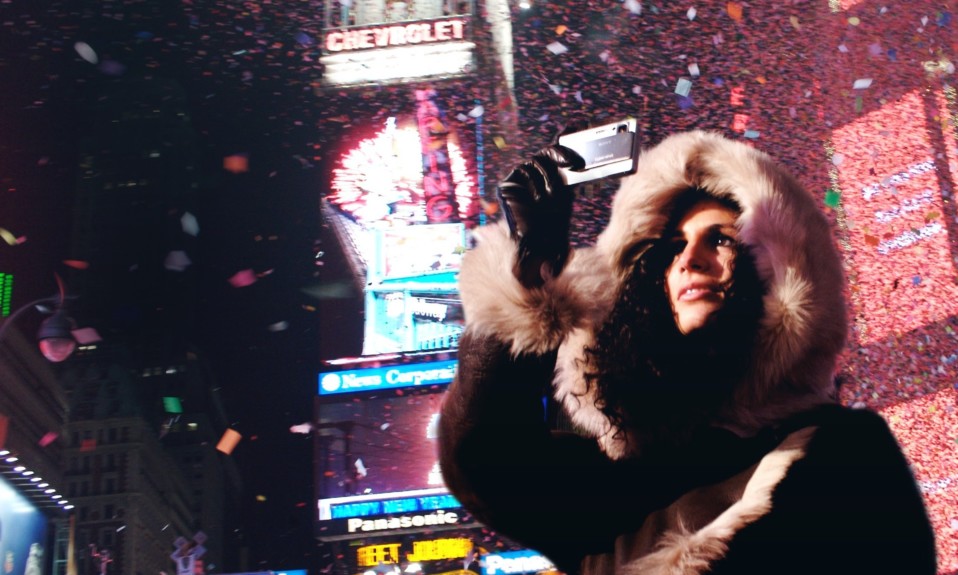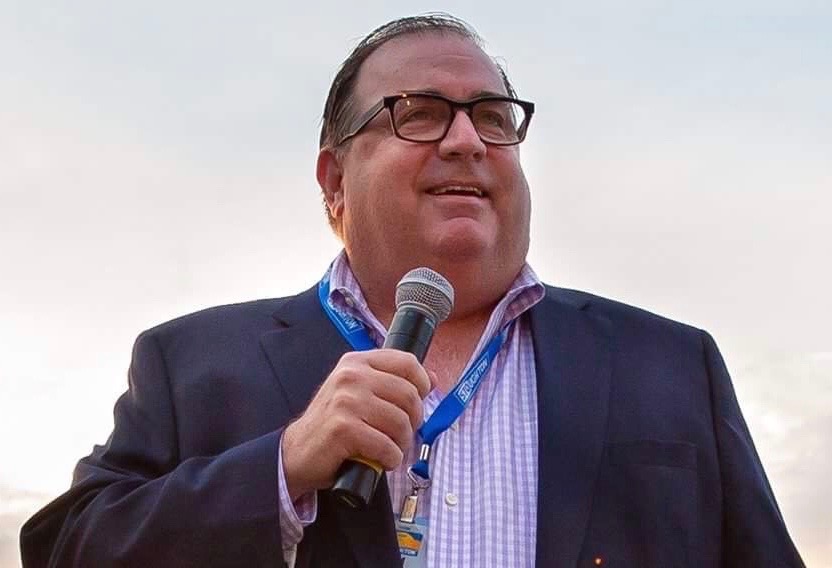The award-winning composer and producer traversed a dark tunnel of addiction before finding recovery—and a new musical path
By Jason Langendorf
A stranger who crosses paths with Russell Howard on the street sees a chiseled, handsome figure who appears more suited for a runway than single-dad duty. Back home in Philadelphia, those closest to Howard regard him as the baby of the family, a sweet kid who grew into an outgoing and prolifically talented young man. The public—especially those immersed in hip-hop culture—knows Howard best as a producer, rapper and occasional actor, a prodigy who was working with artists like Jay-Z and Nipsey Hussle well before he was old enough to buy a drink.
But for a long time, Howard says, no one truly saw him. Maybe himself included.
At the peak of his celebrity, Howard didn’t so much live the rock star life as attacked it. He got to know fellow Lower Merion native Kobe Bryant, then recorded with the NBA star. Howard’s talent was noticed almost instantly, and he was soon introduced to the industry’s heavy hitters. He produced two tracks on Jay-Z’s 1999 multiplatinum album The Life and Times of Shawn Carter, Vol. 3 at age 19. Everything seemed to fall into place. Howard had wealth, endless attention and companionship, and hours upon hours of studio time making music with friends and idols. But what he didn’t have was balance. Or healthy self-esteem. Or comfort in his own skin.
“If I walked into a room and there were 10 people there, and nine gave me the attention that my ego needed, my head was going to focus on that one that didn’t,” says Howard. He points to a Freudian concept that Hazelden Betty Ford Foundation psychologist Tom Cunningham retrofitted for the addiction space in the 1980s: “I had ‘His Majesty the Baby’ syndrome going on really early, and it created an angst—like a restlessness, irritability. I was never really able to be present in the moment where I was.”
An Uneasy Childhood
Howard had grown up as the youngest in a trio of dazzlingly gifted boys, looking up to (and striving to live up to) his older brothers while jockeying for time and validation. His father was a successful litigator—but not right away, which led to a certain discretion with finances. That created a dichotomy in which Howard was raised “knowing that we had money, but we were never treated like that.” Although he considers his family dynamic to have been fully functional, he looks back on the combination of his young personality and early experiences as a sort of unfortunate chemistry: “That was definitely the beginning of an overcompensation.”
When I hit that weed, I felt free from the bondage, the chatter, the ‘King Baby’ [syndrome], the irritability, the nonstop mind, the comparison, the overcompensation, the competition with my brothers. It all went away.”
—Russell Howard
When he hit it big as a teenager, Howard had an open line to engage all his vices and worst impulses, including an array of substances that seemed to scratch an itch inside him. When he smoked his first joint with friends in the park, Howard recalls his buddies giggling and relaxing. Fourteen-year-old Russell’s reaction? He sped down the hill and around the basketball court, shouting to anyone who would listen,“I’m free! I’m free!”
“When I hit that weed, I felt free from the bondage, the chatter, the ‘King Baby’ [syndrome], the irritability, the nonstop mind, the comparison, the overcompensation, the competition with my brothers,” he says. “It all went away. And it became this power. It was mine.”
A “Secret Kind of Potion”
This was the beginning of Howard’s journey with a “secret kind of potion,” an indulgence that grew into an association and then a symbiotic relationship—first with his music making and then, not long after, everything else. He had what he describes as a “self-righteous approach” to getting high, initially using only alcohol and weed. But after tagging along to Orlando, where his best friend was enrolled at the University of Central Florida, Howard was introduced to ecstasy and GHB, a sedative used to treat narcolepsy that he said felt like “a spiritual experience.”
But the very substance that Howard says made him feel empowered, present and free had trapped him. “That drug, from 19 years old to 22 years old, I was taking it every three hours. That’s when I knew. I remember looking in the mirror after taking it and saying to myself, ‘I can’t stop. This drug has me.’”
Howard says he was a “functioning addict” at that time, but he hadn’t reached his lowest point. He was still making music, booking studio time with major artists and partying virtually nonstop. No consequences. No one to tell him no.
So I go out to Los Angeles, nominated for the Grammys for Jay-Z’s album, and I’m dopesick, literally shivering—all of it. My manager is there, and he was like, ‘I can’t believe this. You need help.’”
—Russell Howard
It wasn’t until he was introduced to opioids that Howard received any pushback. An acquaintance tried to steer him away, concerned that he could get hooked and wind up throwing away all his success. Howard says young Russell wasn’t to be denied. “It’s like, ‘I’m going to get what I want. Yeah, get out of my way.’” Soon, Howard was using Oxycontin every day, developing a physical dependence on opioids within weeks.
“So I go out to Los Angeles, nominated for the Grammys for Jay-Z’s album, and I’m dopesick, literally shivering—all of it,” Howard says. “My manager is there, and he was like, ‘I can’t believe this. You need help.’”
Into the Abyss
Howard left the record company and moved to California, telling himself he had to get out of Philadelphia to get away from the opioids. He had burned bridges, turned off friends, begun to feel like a failure. “My eyes looked sick, my weight was down,” he says. “There was no accountability in my life. You couldn’t trust me. I would disappear for days. And then I discovered this drug called crystal meth.”
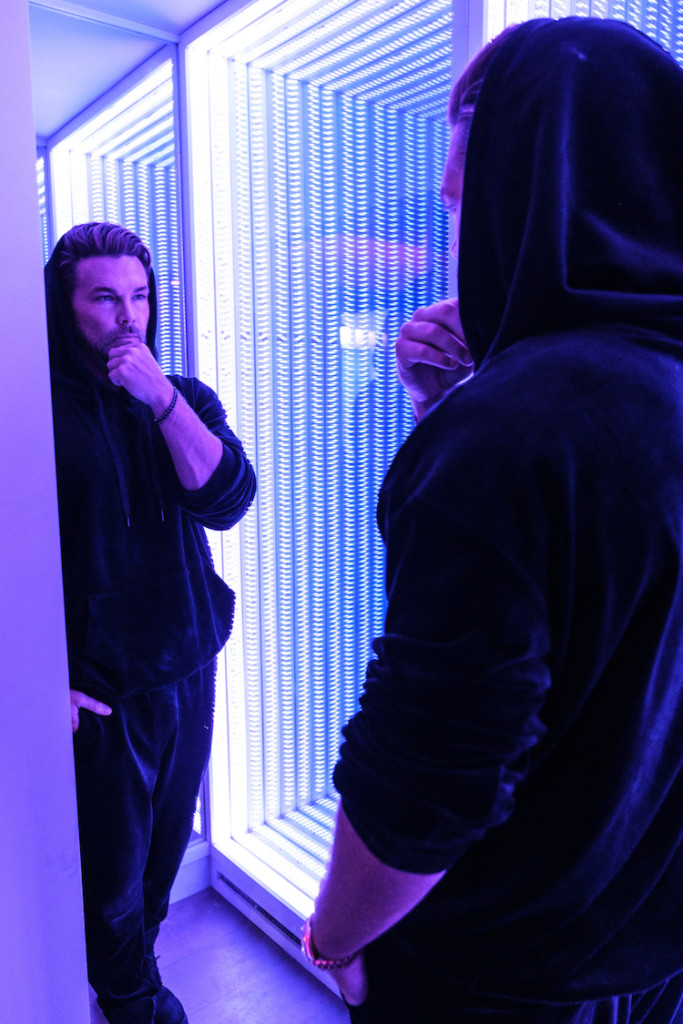
Addiction now had its hooks buried in Howard. He says he hated crystal meth, but for six months he combined it with alcohol and GHB use and, in his words, “went insane.”
“I had binoculars in my car,” Howard says. “From psychosis, I thought people were following me. I was letting gang members use my car, and they would give me drugs instead. I essentially lost my mind.”
Howard was living in a condo next to a new development where another building was going up, with construction being done day and night. He was so paranoid from the light coming through his bedroom window that he slept on his couch. He was convinced the police or DEA would kick down his front door at any second. He bought a bucket, filled it with Clorox and other chemicals, and placed it next to the couch—where he could easily dump his drugs from the coffee table to be quickly dissolved. “It got really weird and really, really dark.”
Howard had blackouts, car accidents (“I’m ashamed to admit it, and I’m so grateful that I didn’t harm anyone”), a trip to the hospital. His father and brother arrived at his apartment, and this time the plea for getting help wasn’t a request. “My dad’s a strong guy, and my brother at that time was lethal—solid rock. One way or another, that was the beginning of my slow surrender.”
Rehab didn’t take initially. Howard wasn’t ready. He was submitted to Hazelden’s Minnesota facility for treatment, and although he followed the steps and began eating better, he says he barely remembers any of his stay. When an aftercare program was recommended, he manipulated the process. He chose a facility back in California called Promises, in Malibu, where he could be near friends and have access to a car. Howard left on a pass on his first day, meeting up with a woman he was dating, and abstained. He left on a pass again the next day, but this time he told himself he could manage his addiction. He used GHB and crystal meth. By that night, he was packing up his things at the treatment facility, waking up patients and making his grand exit, walking shirtless across the front lawn and announcing, “I’m free!”
Howard was only getting started. After returning to his friends’ apartment, he couldn’t sleep and began roaming the apartment complex. “I come across this crew, and I’m like, ‘Come on, guys, I’m ready to party. Let’s go.’ Always looking for some action. Last thing I remember is taking the last sip of this fake GHB. Next thing I know, I feel handcuffs on my wrists. I look up. It’s a cop. And, like a good addict, I say, ‘No, no, no, no. You’ve got the wrong guy. No, no, you made a mistake.’ He says, ‘Oh, really?’ and looks down. Now I look down, and I’m naked. I’ve been walking around the streets of Reseda after being robbed and stripped.”
What followed was a hospital stay and a ride to a hotel from one of his few remaining friends. His car, luggage—everything—was gone, stolen. Howard stood in a hotel room wearing a hospital gown, with literally nothing left to lose, and called his father. “You have one shot,” his father said. Howard called Promises to ask if he could return.
“I spoke to a lady named Suzanne, who has been an amazing person in my life,” Howard says. “A truly beautiful woman. She was just like, ‘God is beautiful. Bottoms are beautiful. Come back.’
“And my first spiritual experience—I always talk about my first real spiritual experience—was being dropped off back in Promises. It was lunchtime, and everyone was eating. And so the whole time, my head’s like, ‘They’re gonna hate me. I made this big debacle, everyone’s going to be cold, no one’s going to welcome me, I don’t even know how to show my face. I have all this shame, all these lies.’ So I go in there anyway, because I was in enough pain, in humility. I walk across the lawn—that same lawn. I open the door. And they clap. And they come up and hug me. And it was genuine. That was the moment I felt there’s something here in this recovery. This is unconditional love. This is different.”
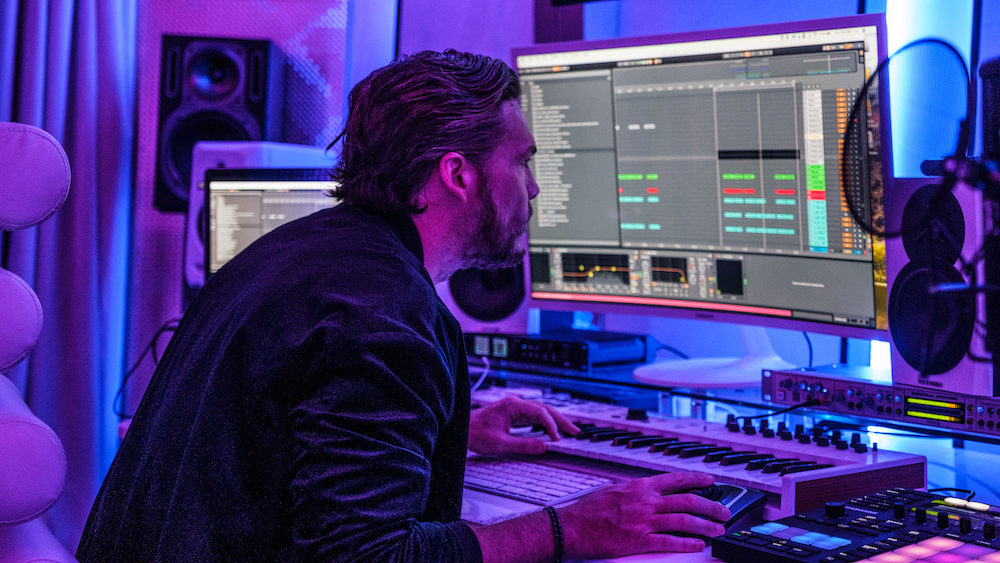
Two Decades of Sobriety
Now going on 20 years sober, Howard has since broken into composing music for television and film. The co-founder of Signature Tracks, he worked on shows such as Keeping Up with the Kardashians and The Bachelorette. Howard looks back on his rise, fall and subsequent recovery as a vital learning experience, the sort of necessary self-exploration that required a rock-bottom realization.
He speaks often about his experiences, and he shares the details not to glorify his past substance use but to reveal the depths of addiction—and to contrast them against the heights his life has reached without alcohol and drugs. “I make much better music now,” Howard says. “Dead sober. Because there are gifts of sobriety: There’s consistency. There’s curiosity. There’s courage. There’s work ethic, discipline.”
Howard is even making music for himself again. But this time he isn’t thinking about Grammys or stardom or partying: “I am in the process of making an album. And it’s cool because I’m coming at it from a different place. I’m coming from a place of, like, this is just me doing this for the love. Not with some agenda or motive.”
Photos: David Litner


